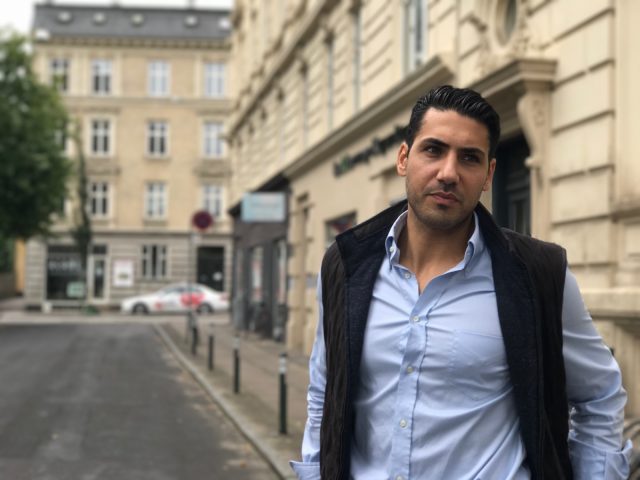CBS is closing down its last business language program

EOK stops admitting new students next year, due to changes in the bachelor portfolio. (Photo: Jakob Boserup)
Senior Management at CBS has decided to close down the last program associated with language, the EOK bachelor, and is converting the IMK Bachelor into a BSc. The study boards, CBS Students, and the trade union, Kommunikation & Sprog, are unsympathetic towards the decision, whereas the Dansk Industri is partly understanding.
The Bachelor in English and Organizational Communication (EOK) has admitted its last round of students.
Wednesday September 13, Senior Management decided that the EOK program is to be closed down and recommended that the Bachelor in Intercultural Marketing Communication (IMK) be converted from a Bachelor of Arts into a Bachelor of Science.
But Bachelor programs aren’t the only ones affected. The Master of Arts in Intercultural Business Communication (MAIBC) will also be turned into a Master of Science program.
The decision is part of a discussion at CBS on how to update the bachelor portfolio, and due to limited research resources EOK has to be closed down, explains Jan Molin, the Dean of Education, in an official statement.
“CBS has educated business-oriented language students for generations. But CBS research resources are limited and we must consider carefully how we will spend those resources in the future. The consequence is that we can no longer offer research-based language programmes in the future. So, this decision is a strategic one, brought on by limited resources”, says Jan Molin and adds:
“Obviously, students enrolled in the affected programmes will be entitled to complete their degree as planned with excellent lecturers”, says Jan Molin in the statement.
CBS WIRE has tried several times to get further comments from Jan Molin who hasn’t been able to answer due to a busy schedule.
“A dangerous tendency”
Hanne Erdman Thomsen and Mette Skovgaard Andersen, the academic directors of EOK and IMK, are sad to see that CBS is moving in this direction and closing down everything that has something to do with language.
“CBS is signaling that it wants to be an ordinary business school with no or only a few subjects within humanities and that’s a shame. CBS has for a long time had both facets, and why not keep it that way?” they ask.
CBS Students are not happy about the decision either.
“Closing down humanities programmes is a step towards further alignment of the programmes at CBS. This is a dangerous tendency, as a broad programme portfolio helps attract a diverse student mass and thereby ensures that we are the diverse business university we aspire to be,” write Jeppe Ask Tofteskov and Andreas Smith Jørgensen, whom are both board members of the Academic Council, in an email to CBS WIRE.
In the official statement, Jan Molin says that CBS will continue to be a divers university.
“CBS will remain internationally known for its work within the business humanities, irrespective of whether we offer traditional language programmes”, says Jan Molin in the statement.
The business sector needs more candidates
Per Lindegaard Hjorth, the president of the trade union Kommunikation & Sprog, argues that the business sector is asking for yet more graduates with a professional set of language skills as part of their education.
“I understand the need to update the educational programs, but CBS is taking a wrong turn by closing everything that has something to do with language. Language has been part of the foundation of CBS, removing that part is a regrettable decision, as the Danish business sector demands more graduates with professional language skills,” he says
At Dansk Industri the message about the closing down of EOK and changing of IMK and MAIBC is in part met with understanding.
“CBS hasn’t got that many resources research wise. And in Denmark, it is required that teaching in higher education is research based. So, if CBS can’t support research based teaching then I think it’s a good decision,” says Charlotte Rønhof, Deputy Director at Dansk Industri.
The need for graduates who understand economics and speak and write professional English is definitely there
Mette Skovgaard Andersen, Director of IMK study board
But Charlotte Rønhof isn’t entirely happy about the decision, as she has worries whether the market will experience a lack of candidates with the ability to speak business English, just like Per Lindegaard Hjorth expects.
“There are more things to say about this. First of all, this shows that we really need a national language strategy. What languages do we need and where should they be based? And it is obvious that we need graduates who know business English, and not only Shakespeare,” she says.
High School English isn’t enough
CBS hasn’t had a clear-cut language education for years, but instead, it has practiced a combination of business and language, giving the graduates a unique combination of skills, says Hanne Erdman Thomsen.
“The need for graduates who understand economics and speak and write professional English is definitely there,” she says.
Margrethe Mondahl, Associate Professor and Director of the MAIBC study board, agrees with Hanne Erdman Thomsen on the need for professional language skills.

“If you think you can get deals closed with your high school English, you are wrong. Communicating with stakeholders in their own language is a crucial competence in terms of managing business deals, and it gives you a possibility to understand your customers and stakeholders at a professional level,” she says.
Lack of dialogue
The decision-making process leading to today’s decision started back in January, when Senior Management sent out a document addressing the upcoming and possible changes for EOK, IMK and the MAIBC.
The different programs’ study boards had the possibility to state their opinions on the possible changes, but according to Mette Skovgaard Andersen and Hanne Erdman Thomsen they were never invited to a concrete discussion about what it would mean for IMK if they got converted to a BSc or whether EOK thought that it would be possible to convert it into a BSc.
“We were never asked to give our professional evaluation regarding the changes, and how we pictured the development of the courses. In the beginning of June, we received a document stating two possible models. The process didn’t seem transparent at all,” says Mette Skovgaard Andersen.
Hanne Erdman Thomsen adds:
“Senior Management had already made a decision when they presented the models to us and to the Academic Council. They explicitly recommended model B, and we couldn’t do much to change that decision,” says Hanne Erdman Thomsen.
CBS Students, who have been part of the meetings with the Academic Council when the case had been discussed in September, is also criticizing the decision-making process.
“We believe that the process leading up to the decision did not properly involve the affected study boards. In the case of EOK, management did not have talks with the study board about the possibility of changing the program into a BSc. Instead, they opted to simply close down the program,” writes Jeppe Ask Tofteskov and Andreas Smith Jørgensen.
Furthermore, they don’t think the arguments laid out by the Senior Management justified the closing down of the programs.
“Specifically, we did not find that the arguments about the lack of quality in the programs, GPA of students enrolled, and lack of internal CBS flexibility to justify their being shut down. The reason for closing down the program seems, instead, to be a long-term strategic decision involving the future of language education in Denmark being concentrated in a few universities. But this has not been clearly communicated. Combined with the lack of a proper process, this means that CBS Students cannot support the senior management in this decision,” they write.


































































































































As a very pleased EOK graduate, this decision saddens me greatly. From my own experience, there’s absolutely no doubt that the combination of business communication and professional English is in high demand in international organizations. The EOK program offers its students the comprehensive set of skills necessary to solve complex communication tasks in contemporary large, international organizations. My colleagues and managers indeed agree with me here. So, too bad for CBS, too bad for businesses and too bad for future students interested in language.
These decisions, like earlier ones involving foreign languages, reveal a lack of quality in one place only, namely in the management of CBS, of both the board (bestyrelse) and ‘direktionen’, which is what the management/leadership chooses to refer itself as – which is symptomatic of insensitive, incompetent language proficiency.